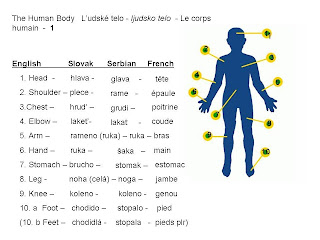Endings for the 1st, -am, conjugation group of verbs in Serbian in the Present Tense are
-am - aš - a -amo -ate -aju
Endings for the Accusative Fem. Nouns:
Nouns in Singular + question ''šta'' (what) requires the noun in Accusative - find out what the rule is for the Nouns which are Feminine Singular:
Yes, you are right, the ending for Sg. Fem. Noun in Accusative is - U, while
Sg. Masc and neuter have no endings (at least not in the inanimate category).
Now, let's check what's happening in the Plural with Fem. nouns:
Pl. Masc. gets an -i ending, and it also changes to -e, like in "odgovor" - so for plural, don't think
twice, simply add -E and you'll do it splendidly :)
Neuter nouns in Pl. add -a, but then they don't change in Accusative, which is also very nice. So, we
have the example "odelo" in Sg., "odela" in Pl. and then, "Kupio sam odela" IN Acc. is the same.
Let's practise:
-am - aš - a -amo -ate -aju
Endings for the Accusative Fem. Nouns:
Nouns in Singular + question ''šta'' (what) requires the noun in Accusative - find out what the rule is for the Nouns which are Feminine Singular:
- ŠTA ČEKAŠ? ČEKam tvoj ODGOVOR. (odgovor - answer)
- ŠTA ČITAŠ? ČITam KNJIGU. (knjiga - book)
- ŠTA GLEDAŠ? GLEDam PRIREDBU. (priredba - show)
- ŠTA IGRAŠ? IGRam ODBOJKU. (odbojka - volleyball)
- ŠTA IMAŠ? IMam SVESKU. (sveska - notebook)
Let's practise:
Yes, you are right, the ending for Sg. Fem. Noun in Accusative is - U, while
Sg. Masc and neuter have no endings (at least not in the inanimate category).
Now, let's check what's happening in the Plural with Fem. nouns:
- ŠTA OBOŽAVAŠ? OBOŽAVAM KNJIGe. (knjiga - knjige = book - books)
- ŠTA PEVAŠ? PEVAM PESMe. (pesma - pesme = song -songs)
- ŠTA PRIČAŠ? PRIČAM PRIČe. (priča - priče = story - stories)
- ŠTA KUPUJEŠ? KUPUJEM HALJINe. (haljina - haljine = dress - dresses)
- ŠTA RUČAŠ? RUČAM PEČURKe. (pečurka - pečurke = mashrooms)
- ŠTA ČEKAŠ ? ČEKAM ODGOVORe (odgovori - odgovore = answers)
Pl. Masc. gets an -i ending, and it also changes to -e, like in "odgovor" - so for plural, don't think
twice, simply add -E and you'll do it splendidly :)
Neuter nouns in Pl. add -a, but then they don't change in Accusative, which is also very nice. So, we
have the example "odelo" in Sg., "odela" in Pl. and then, "Kupio sam odela" IN Acc. is the same.
Let's practise:

.png)

















